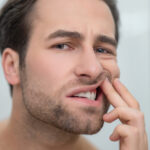Thanks to advanced techniques and new medications, periodontal surgery should be a smooth, pain-free procedure. Non-steroid anti-inflammation drugs like Naprosyn and Motrin stop the formation of chemicals the body normally produces that cause pain. Plus, these are not narcotics, allowing you to function without a problem. Patients start NSAIDS the morning before surgery and take them for six days. The surgeon may recommend a narcotic for the first day to eliminate any discomfort. Patients must take these prescriptions as directed to optimize postoperative healing.
A temporary is often prescribed after surgery and may be used for several weeks. It kills bacteria throughout the mouth and is more effective than over-the-counter mouthwash.
Sutures are removed at 7-10 days and the area is cleaned prior to review. Surgical results are greatly enhanced with careful plaque control during the healing phase.
Pre-Surgical Instructions:
Relaxation
Those apprehensive about periodontal surgery can relax with nitrous oxide (laughing gas), presurgical sedatives (oral medication similar to Valium) or IV sedation. If you choose to take a pre-surgical sedative or are scheduled with IV sedation, please arrange for someone to drive you to and from your appointment.
Prescriptions
Please have prescriptions filled postoperatively. You may bring them to your appointment if you’d like assistance with the instructions. Unless directed otherwise please do not take any of the medications until after treatment. Regular medications prescribed by your general physician should be taken as usual. Since ibuprofen/aspirin tend to prolong bleeding, do not take these medications for seven days prior to your appointment.
Alcohol and Caffeine
Do not drink any alcoholic beverages 24 hours prior to your appointment and do not consume any caffeinated products the day of your appointment.
Dress
Avoid collared or white shirts and wear loose, comfortable clothing. Women, please do not wear facial makeup. Men, if you have a mustache, we ask that you trim it so it does not extend below your upper lip.
Meals
You should eat a normal, healthy breakfast at least one before your surgery, unless you are scheduled with IV sedation.
During Surgery Relaxation
Any sedative medications used will help you relax, but you will remain awake. A local anesthetic will be used on the treated area so you will be comfortable throughout the procedure.
Comfort
Blankets, pillows and music headphones are available if you choose.
Sutures
Stitches will be placed in the treated areas.
Post-Surgical Instructions
Discomfort
Don’t be alarmed if you have a certain amount of discomfort for a few days following surgery. Tylenol or Advil should help relieve any pain. Your surgeon will provide a prescription for a more potent medication to enhance a mild post-surgical recovery period. Take the first dose as soon as possible following surgery, then use the medication every 6 hours as needed. Be sure to take this with food to prevent nausea.
Swelling
Place an ice pack over the area to minimize any swelling. For the first 24 hours, follow the ’20 minutes on, 20 minutes off’ protocol. Start using ice as soon as possible postoperatively. Hold cold water with ice chips in your mouth when the ice pack is not in place for the rest of the day. Try avoiding rinsing on the day of surgery to prevent disturbing the blood clot. Swelling or discoloration should subside several days after surgery. If swelling continues after day two, heat may be applied using wet or dry compresses.
Bleeding
Some normal seepage or slight bleeding should be expected the first day. If continuous bleeding occurs, you can place a moist fresh tea bag over the area with constant pressure for 20 minutes.
Posture
Patients should keep their head elevated for the first two days after surgery. Sleep with a few pillows behind you and maintain an upright position to reduce swelling.
Diet
Try eating on the side of the mouth where surgery was not performed. Ensure, milkshakes and instant breakfasts are advised the day of surgery. You can begin eating soft foods the day following surgery until gradually returning to your normal diet. Adequate nutrition plays an essential part in the healing process. Spicy and acidic foods, as well as carbonated beverages should be avoided for at least three days. For the first month, patients should also stay clear of popcorn, nuts, granola and small seeds.
Oral Hygiene and Rinsing
The first day after surgery, carefully brush and floss your teeth in the areas where surgery has not been performed. Do not brush or floss your teeth where you have stitches, but rinse your mouth with the prescription rinse your surgeon provided. This ensures that the surgical site will be clean, odor-free and reduce discomfort. You will be informed how and when to resume brushing at your suture removal appointment.
Alcohol and Smoking
Do not consume alcohol for the first week postoperatively, as well as if you are taking discomfort medication. Because smoking causes healing to progress more slowly, do not smoke for at least four hours following surgery. We advise that you minimize smoking and alcohol consumption for the entire time for the best long-term results.
Activity
Patients should also avoid strenuous activity for one week.
You are more than welcome to contact the office should you have any questions or concerns. After normal office hours, our automated voice message system will answer your call and prompt you to press ‘0’ to be connected to a live operator. The live operator will then connect you with a doctor.


